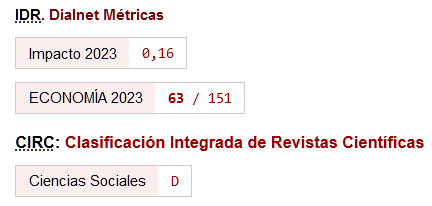Bogus academics or misinterpretation? Piketty's claims on Marx
Keywords:
Marxist economics, productivity, wages, profit rateAbstract
This article subjects to critical analysis the set of statements T. Piketty attributed to K. Marx in his already famous work The capital of the XXI century, ranging from general methodological aspects, through specific issues relating to both technology of production and the sphere of distribution, to the law of the downward trend in the rate of profit. These controversies are relevant because much of the same questions are common place for those who have not read Marx, and in turn suffer from a lack of academic ethics when they prioritize disqualification over rigorous debate. Thus, this paper demonstrates Piketty´s mistakes not only from original sources, but also from reasoning with respect to the global aspects of Marx´s economic theory
Downloads
References
Acemoglu, Daron y James Robinson (2014): "The rise and decline of general laws of capitalism", Journal of Economic Perspectives, Vol. 29, No. 1, pp. 3-28.
https://doi.org/10.1257/jep.29.1.3
Althusser, Louis (1965): La revolución teórica de Marx, México DF: Siglo XXI, 1979.
Anderson, Kevin (2010): Marx at the margins. On nationalism, ethnicity and Non-western societies, Chicago: The University of Chicago Press.
https://doi.org/10.7208/chicago/9780226019840.001.0001
Astarita, Rolando (2010). "La PTF, sinsentido y mistificación", 28 de noviembre. Disponible en https://rolandoastarita.wordpress.com/2010/11/28/la-ptf-sinsentido-y-mistificacion/
Astarita, Rolando (2014): "Reflexiones desde el marxismo sobre el libro de Piketty", 18 de mayo. Disponible en https://rolandoastarita.wordpress.com/2014/05/18/reflexiones-desde-el-marxismo-sobre-el-libro-depiketty-1/
Barberá, Antonio Rafael y Luis Miguel Doncel (2003): La moderna economía del crecimiento, Madrid: Síntesis.
Bernstein, Edward (1893): Ferdinand Lassalle as a social reformer. London: Swan Sonnenschein & CO. Disponible en www.forgottenbooks.com
Burkett, John (2000): "Marx's concept of an economic law of motion", History of Political Economy, Vol. 32, No. 2, pp. 381-94.
https://doi.org/10.1215/00182702-32-2-381
Carey, Henry (1835): Essay on the rate of wages: with an examination of the causes of the differences in the condition of the laboring population throughout the world. Carey, Lea & Blanchard, Philadelphia. Disponible en https://ia802605.us.archive.org/14/items/essayonratewage01caregoog/essayonratewage01caregoog.pdf
Cullenberg, Stephen (1999): "Overdetermination, totality, and institutions: a genealogy of a Marxist institutionalist economics", Journal of Economic Issues, Vol. XXXIII, No. 4, pp. 801-15.
https://doi.org/10.1080/00213624.1999.11506214
Ekélund, Robert y Robert Hébert (1992): Historia de la teoría económica y de su método, Madrid: Mc Graw-Hill, 1999.
Fleetwood, Steve (2012): "Laws and tendencies in Marxist political economy", Capital & Class, Vol. 36, No. 2, pp. 235-62.
https://doi.org/10.1177/0309816812437921
Freeman, Alan (2010): "Crisis and 'law of motion' in economics: a critique of positivist Marxism", Review of Political Economy, No. 26, pp. 211-50.
https://doi.org/10.1108/S0161-7230(2010)0000026008
Grossmann, Henryk (1929): La ley de la acumulación y del derrumbe del sistema capitalista, México DF: Siglo XXI, 1979.
Guerrero, Diego (1989): Acumulación de capital, distribución de la renta y crisis de rentabilidad en España (1954-1987), Tesis Doctoral, Universidad Complutense de Madrid.
Guerrero, Diego (1995): Competitividad: teoría y política, Barcelona: Ariel.
Guerrero, Diego (2000): "Depauperación obrera en los países ricos: el caso español", en Diego Guerrero (ed.) Macroeconomía y crisis mundial, Madrid: Trotta, pp. 225-43.
Harris, Donald (1978): Acumulación de capital y distribución del ingreso, México DF: Fondo de Cultura Económica, 1986.
Ivanovich, Pert (1959): Manual de economía política. Madrid: Alba, 1988.
Kliman, Andrew (2007): Reclaiming Marx's Capital: a refutation of the myth of inconsistency. Lanham: Lexington Books.
Krusell, Per y Anthony Smith (2015): "Is Piketty's 'second law of capitalism' fundamental?", Journal of Political Economy, Vol. 123, No. 4, pp. 725-48.
https://doi.org/10.1086/682574
Lapides, Kenneth (1998): Marx's wage theory in historical perspective. Its origins, development and interpretation, Tucson: Wheatmark, 2008.
Lipsey, Richard y Kenneth Carlaw (2004): "Total factor productivity and the measurement of technological change", The Canadian Journal of Economics, Vol. 37, No. 4, pp. 1118-50.
https://doi.org/10.1111/j.0008-4085.2004.00263.x
Losurdo, Domenico (2013): La lucha de clases: una historia política y filosófica, Barcelona: El Viejo Topo, 2014.
Maito, Ezequiel (2014): "Piketty versus Piketty: La tendencia descendente de la tasa de ganancia en el Reino Unido y Alemania desde el siglo XIX confirmada por los datos de Piketty", Revista de Economía Critica, No. 18, pp. 250-64.
Marx, Karl (1847): Miseria de la filosofía, México DF: Siglo XXI, 1987.
Marx, Karl (1848): El Manifiesto del Partido Comunista, Madrid: Alhambra Longman, 1995.
Marx, Karl (1849): Trabajo asalariado y capital. Madrid: VOSA, 1989.
Marx, Karl (1857-58): Elementos fundamentales para la crítica de la economía política (Grundrisse) 1857- 1858, 2 vols. México DF: Siglo XXI, 2005, 1972.
Marx, Karl (1859): Contribución a la crítica de la economía política. Madrid: Siglo XXI, 2000.
Marx, Karl (1861-1863): Teorías sobre la Plusvalía, 2 vols, México DF: Fondo de Cultura Económica, 1980.
Marx, Karl (1867): El Capital, libro I, Madrid: Akal, 3 vols, 1976.
Marx, Karl (1875): Critica del programa de Gotha, Pekín: Ediciones en Lenguas Extranjeras, 1979.
Marx, Karl (1894): El Capital, libro III. Madrid: Akal, 3 vols, 1978.
Marx, Karl y Friedrich Engels (1868-70): Collected Works, vol. 43. London: Lawrence & Wishart, 2010.
Mateo, Juan Pablo (2007): La tasa de ganancia en México, 1970-2003. Análisis de la crisis de rentabilidad a partir de la composición del capital y la distribución del ingreso, Tesis doctoral, Universidad Complutense de Madrid.
Mateo, Juan Pablo (2015): "On laws of motion, determinism and overdetermination. The case of the law of the tendency of the rate of profit to fall", Working Paper 2015-03, John Jay College of Criminal Justice, CUNY.
Mateo, Juan Pablo (2017): "Fundamentos teóricos y leyes económicas en El Capital de Piketty. Un análisis crítico", Cuadernos de Economía, Vol. 36, No. 70, pp. 227-49.
https://doi.org/10.15446/cuad.econ.v36n70.58697
Mateo, Juan Pablo y Vicente Lima (2012): "Aspectos metodológicos en el análisis del cambio tecnológico. Una perspectiva holista", Principios. Estudios de Economía Política, No. 20, pp. 105-126.
Moseley, Fred (2015): "Piketty and marginal productivity theory. A superficial application of an incoherent theory", International Journal of Political Economy, No. 44, pp. 105-20.
https://doi.org/10.1080/08911916.2015.1060828
New Republic (2014): "Thomas Piketty: I don't care for Marx. An interview with the left's rock star economist", 5 de mayo. Disponible en http://www.newrepublic.com/article/117655/thomas-pikettyinterview-economist-discusses-his-distaste-marx
Ong, Naipew (1980): "Marx's classical and post-classical conceptions of the wage", en John C. Wood (ed.) (1988) Karl Marx's economics. Critical assesments, vol. III, Londres & Nueva York: Routledge, 1991, pp. 704-19.
Piketty, Thomas (2013): Capital in the twenty-first century. Cambridge: Harvard University Press, 2014.
Roberts, Michael (2015): "Thomas Piketty and the Search for r", Historical Materialism, vol. 23, No. 1, pp. 86-105.
https://doi.org/10.1163/1569206X-12341392
Rognlie, Matthew (2014): "A note on Piketty and diminishing returns to capital", Dept. of Economics, Massachusetts Institute of Technology, 15 de junio. Disponible en http://www.mit.edu/~mrognlie/piketty_diminishing_returns.pdf
Rosdolsky, Roman (1968): Génesis y estructura de El Capital de Marx, Madrid: Siglo XXI, 1978.
Rosenberg, Nathan (1976): "Marx as a student of technology", Monthly Review, vol. 28, No. 3, pp. 56-76.
https://doi.org/10.14452/MR-028-03-1976-07_5
Shaikh, Anwar (1990): Valor, acumulación y crisis: ensayos de economía política, Bogotá: Tercer Mundo Editores, 1991.
Shaikh, Anwar y Ahmet Tonak (1994): Measuring the wealth of nations: the political economy of National Accounts. Cambridge: Cambridge University Press.
https://doi.org/10.1017/CBO9780511528330
Solow, Robert (1956): "A contribution to the theory of economic growth", Quarterly Journal of Economics, No. 70, pp. 65-94.
https://doi.org/10.2307/1884513
Solow, Robert (2014): "Thomas Piketty is Right", New Republic, 22 de abril. Disponible en http://www.newrepublic.com/article/117429/capital-twenty-first-century-thomas-piketty-reviewed
Summers, Lawrence (2014): The inequality puzzle, Democracy, No. 33. Disponible en <http://www.democracyjournal.org/33/the-inequality-puzzle.php?page=all>
Valle, Alejandro (1991): "Productividad: las visiones neoclásica y marxista", Investigación Económica, Vol. L, No. 198, pp. 45-69.
Westphal, Kenneth (2003): Hegel's epistemology. A philosophical introduction to phenomenology of spirit, Indianapolis/Cambridge: Hackett.
Wolff, Richard y Stephen Resnick (2012): Contending economic theories: Neoclassical, Keynesian, and Marxian, Cambridge: MIT Press.
Downloads
Published
How to Cite
Issue
Section
License
This licence allows third parties to share (copy and redistribute the material in any medium or format) and adapt (remix, transform and create from the material for any purpose, including commercial purposes), provided that authorship and first publication in this journal (The Journal, DOI of the work) is acknowledged, a link to the licence is provided, and it is stated whether changes have been made to the work.







